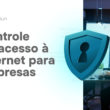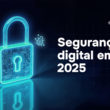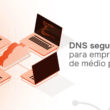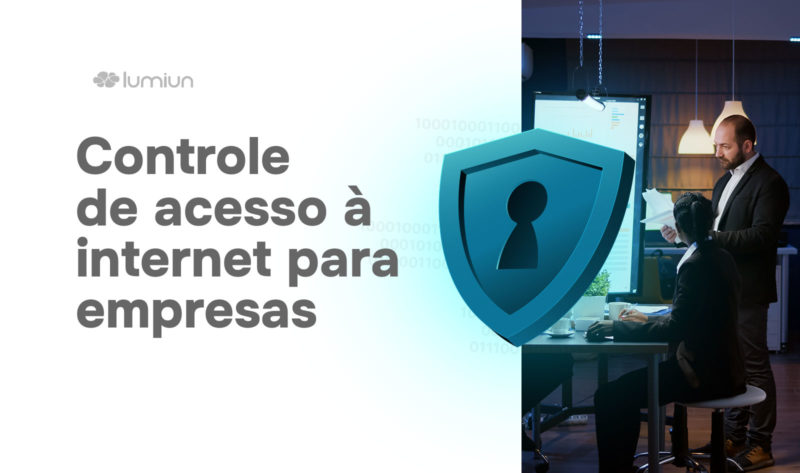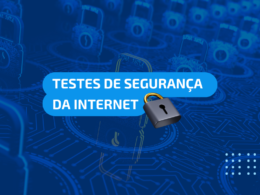Did you know that in 2023, 83% of Brazilian companies paid redemptions after cyber attacks? And that a single data leakage can cost millions and destroy years of reputation? Internet access control is the key to preventing these problems and ensuring the safety and reliability of your business.
Internet access control is an essential practice for corporate security. With the advancement of digital threats, companies need to protect their data and their image to the market. In addition, this approach goes far beyond simple attack prevention, directly influencing the perception of reliability and responsibility of the company.
Internet access control blocks improper and dangerous content, ensuring the intelligent and productive use of resources by employees. On the other hand, the lack of monitoring can expose vulnerabilities , resulting in security problems that cause damage to the company's reputation.
With this in mind, we prepare this article that addresses how access control protects companies against image crises, data leakage and financial losses. Presenting recommended tools, strategies and practices to implement effective internet access control.
The impact of internet access control on company security
Internet access control reduces the risk of cyber attacks by limiting access to malicious sites and protecting confidential data. Consequently, companies that monitor the use of the network can quickly react to threats, preserving their integrity and the trust of customers and partners. In fact, the relationship between digital security and corporate reputation is direct. Thus, companies that show commitment to the protection of systems and data convey an image of responsibility and reliability. On the other hand, security failures lead to irreparable damage to the trust of customers and business partners.
In addition to preventing unauthorized accesses, internet access control contributes to the identification of suspicious behaviors within the corporate network. With this, it is possible to react quickly to possible threats, minimizing impacts and protecting the integrity of the organization.
For this reason, investing in access control tools is not just a security measure, but a strategy to preserve and strengthen the image of the organization before the market and consumers.
What is Internet Access Control
Simply put, Internet access control refers to the practice of managing and restricting network use through policies and tools. In other words, this may include blocking of malicious websites, monitoring activities and definition of functions based on function or departments within the organization.
Companies can implement this control in a variety of ways, such as with the help of firewalls , content filtering software and proxies . Thus, these solutions protect systems against external threats and ensure the use of corporate resources for productive purposes.
The main objective of internet access control is to reduce vulnerabilities and ensure that the internet contracted by the company is used responsibly. Thus, in addition to preventing safety incidents, this approach promotes a more organized and efficient work environment.
How access control helps prevent cyber attacks
Cyber attacks such as phishing , malware and ransomware are constant threats for companies of all sizes. Given this, internet access control prevents incidents by blocking websites and malicious content before causing problems, becoming an effective safety measure.
Many access control solutions are capable of identifying malicious links in emails or fraudulent websites, blocking these threats. Thus, these solutions protect employees from information theft attempts or the installation of malicious programs.
In addition, the segmentation of internet access based on functions or departments allows the company to limit unnecessary risk exposure. Consequently, critical areas, such as finance , have the higher level of protection, significantly reducing the chance of compromising sensitive data.
Implementation of access control tools and policies is critical to creating an initial barrier against attacks. In this way, the company strengthens its digital security and protects the continuity of its operations.
As the company's reputation is at stake when internet access is not controlled
Failures on access control can have a devastating impact on customer and partners trust. In fact, an incident of insecurity , such as a data leakage, even if small, can hurt years of work to build a solid reputation.
Meta, a company responsible for Facebook, has been the target of an attack that explored failures on its APIs , causing data leakage from millions of users. Exposed information includes names, email addresses and other personal data, raising concerns about safety and privacy on the platform.
Companies that suffer cyber attacks often face public crises and negative media exposure. In addition, there are also indirect costs related to image recovery and investment in new security measures.
A survey conducted by Sophos , which collected data from 5,000 IT/cybersecurity security leaders in medium -sized organizations, showed that, among the organizations that paid ransomware attacks, an average of 1.22 was spent an average of 1.22 million dollars . In addition to the rescue, there were recovery costs, showing that this value is only part of the real losses after an attack.
Organizations that implement access control show commitment to security and responsibility. Thus, not only avoid incidents and costs related to them, but also reinforces the trust of customers and stakeholders . Therefore, not eglose internet access control is not an option for companies that want to stay protected and ensure a good reputation.
The relationship between leaked data and damage to reputation
Data leakage is one of the most harmful incidents a company can face. When confidential information is exposed, the confidence of customers and partners is considerably shaken , bringing a direct impact on the reputation of this organization.
In addition to the initial impact, data leakage can result in negative and prolonged repercussions, such as media coverage and greater scrutiny of regulators . Therefore, companies that suffer this type of incident also face difficulties to attract new business.
In 2024, the government's cyber incident prevention, treatment and response center , linked to the institutional security office, reported that there was a record of 3,253,000 data leaks only in 2024. These data are worrying, considering that they represent more than more than double the 1,615 incidents registered between 2020 and 2023 .
Considering these factors, access control is a key preventive measure. Therefore, it protects sensitive data from improper access and reduces the risk of security incidents cause computational damage to your company.
How access control helps protect the company's image
The company's image is its most valuable asset and can easily be impaired by insecurity incidents. Therefore, Internet access control ensures online activities safely and ethically, preventing problems. According to a study by AX4B revealed that 58% of small and medium -sized companies facing a severe cyberatoque end up to six months, highlighting the importance of continuous investments in digital safety.
Blocking access to inappropriate websites and monitoring the use of the internet in the work environment helps to avoid behaviors that generate internal and external problems. These actions make the company demonstrate the commitment to corporate responsibility and transmits confidence to customers and partners .
In addition, the implementation of clear access control policies contributes to the creation of a more disciplined and productive work environment. This measure reinforces the perception that the company is professional and committed to best digital security practices . It is fundamental to preserve and strengthen the reputation of the company , showing the market that the organization prioritizes integrity in all its operations.
Tools and strategies for effective access control
Effective access control combines technology with well -structured policies . That is, content filtering , real -time monitoring , and the use of next -generation firewalls are some of the most used tools to keep the digital environment protected.
Tools such as permissions segmentation are very important. Therefore, limiting access based on hierarchies or specific functions helps reduce exposure to unnecessary risks and maintains sensitive areas more protected against possible attacks.
In addition, another key measure is the continuous training of employees . When employees understand the importance of access control and follow the policies established, the effectiveness of the tools and the strategies implemented amplify.
Internet Access Control Solutions
There are currently several solutions available to help companies manage internet access efficiently. These include robust firewalls to advanced filtering and monitoring systems , these tools ensure threat protection and promote responsible network use .
Modern software, such as Lumiun DNS , offer features such as automatic malicious websites , real -time monitoring and creation of use reports . Thus, these resources allow managers to adjust their access policies as the company's needs, increasing their efficiency and safety .
In addition, solutions such as VPN and Proxys not only protect sensitive data, but also ensure that online activities are safely conducted even in remote environments.
The implementation of these technologies allows the company to strengthen its digital safety posture , avoiding insecurity incident and ensuring the continuity of its operations.
Implementation of restricted access policies
Establishing clear access control policies is critical to managing digital security and ensuring employee productivity. These policies must be customized according to each department or function within the organization, reflecting the specific needs and responsibilities of each sector.
Examples of effective access control policies:
- Category Restriction : Blocking access to entertainment sites, games or social networks for functions that do not need these tools.
- Segmented Permissions : Departments such as IT can have greater access to online resources to perform their tasks, while areas such as financial should prioritize data security .
- Specific Time : Limiting the use of certain sites during office hours, keeping the team focused on main activities.
Examples of effective access control policies include the use of multifactorial authentication , network segmentation and minimum permissions required . In addition, the application of a minimum privilege policy ensures that employees have access only to the resources needed to perform their tasks, thus reducing the chance of improper information exploration.
Thus, the implementation of these policies should be part of a broader cyber security strategy , and is accompanied by other protection measures, such as data encryption and network traffic analysis .
Examples of good practices for access control policies
access control policies to be effective, first, good practices must be followed during their implementation and maintenance. For example, one of the first practices is to perform a risk analysis to identify the most sensitive data of the company and who should have access to this information. In addition, this includes the creation of function -based access profiles , so that employees have only the level of access needed to perform their tasks.
The implementation of robust identity management is another recommended practice. strong authentication can be adopted , such as complex passwords combined with multifactorial authentication . Thus, this verification reduces the chance of unauthorized access and strengthens the safety of the entire network.
Maintaining a periodic access to access is essential to ensure safety. In addition, this process allows you to continually evaluate those who have access to which features and adjust permissions as needed. For example, it is recommended to do it every semester or whenever important changes in the company's structure.
These access policies must be well documented, and all employees must have access to them and know how to follow the guidelines. security policy manual can be created , and it is important to implement regular training to reinforce the importance of cyber security and compliance.
The role of access control in business continuity
Internet access control plays a key role in business continuity, especially regarding the prevention of operational interruptions caused by cyber insecurity incidents . In fact, a company that can adopt an effective access control system not only minimizes the impacts of cyber attacks , but prevents data leakage , intellectual property theft or damage to critical systems.
In addition to protecting data, access control helps to prevent security incidents from causing paralysis in the company's processes. Consequently, when correctly implemented, it minimizes damage caused by attacks , limits the spread of threats in the network and protects critical systems.
An analysis by Security Design LAB , a global cybersecurity research and development network, showed that companies suffering cyber attacks could lose about 7.5% in the value of their shares . In addition, and SSA fall does not happen on the first or second day after a cyber attack, but usually after almost 60 days of the attack. In addition, the survey also revealed that, one year after the attack , 7 among 10 companies still have difficulties recovering and reaching the levels of their respective sectors.
Therefore, access control should be seen not only as a preventive measure, but also as a key component in business continuity . In addition, cyber security should be integrated into the risk management strategy , ensuring that the operation remains resilient even in the face of incidents.
Reduction of operational and financial risks
Access control is a tool to reduce operational and financial risks in a company. In fact, restricting access to sensitive information helps the company to decrease the chances of data leakage , cyber attacks and human failures , which may result in considerable financial losses . In addition, incident prevention not only helps protect the company's assets, but also to reduce costs associated with data recovery and damage repair .
One of the most relevant ways in which access control helps reduce financial risks is by preventing internal fraud . When the employee has access only to the information needed to perform his function, it is less likely to engage in malicious activities such as data theft or financial information handling .
Examples of how access control may result in significant losses include cases in which cyber attacks result in financial losses for the company. Organizations that do not have a robust access control system can be easier hacker targets , compromising critical systems and making large sums of money required in ransoms .
A clear example of this risk was the ransomware attack on the colonial Pipeline in 2021. Hackers explored committed credentials and, due to the lack of robust access control, were able to block critical operations from the company. The result was the interruption of fuel supply in various regions and a millionaire loss - the company had to pay about $ 4.4 million in rescue to resume control of its systems.
By investing in an effective access control system , companies not only protect their data, but avoid financial and operational .
Guarantee of a safe and productive environment
One of the biggest benefits of internet access control is the creation of a safe and productive environment. With well -defined policies and robust security systems, employees work with the peace of mind that company data is protected. This reduces safe worries and allows the team to focus on their tasks, without interruptions caused by cyber incidents.
In addition, a safer environment favors increased productivity as it eliminates the need for concern for exposure to digital risk . Limiting access to work -related websites and applications contributes to keeping employees focused on their activities without unnecessary distractions. This results in greater efficiency and organizational performance .
A safe environment strengthens employees' confidence as they know that the company is committed to data protection and incident prevention . This impairment increases employees' loyalty and reduces turnover , improving collaboration within the organization.
Thus, we can understand that ensuring a safe and controlled environment not only protects information , but also drives trust and productivity . By creating an environment where safety and focus are together, the company can improve its operating results high level performance .
Benefits of Internet Access Control for your company's reputation
Access control goes far beyond data protection and can have a significant impact on an organization's reputation, especially in a scenario where consumers are increasingly aware of the security of shared information with companies.
robust access control practices , it demonstrates a commitment to safety that strengthens its image to the market and consumers. We know that the company's reputation is a valuable asset, and ensuring the protection of customers and partners is critical.
The relationship between cyber security and corporate image is clear: a data violation can result in irreparable damage to consumer confidence, directly affecting the public perception of your company. Companies that maintain good security practices, such as Internet access control, show greater commitment to protecting the privacy and security of their customers and partners. This not only strengthens your reputation, but it can also become a competitive differential .
This means that companies that invest in effective access control can use this as a marketing , highlighting their safety policies and highlighting how they can protect their customers information with maximum rigor . In addition to attracting new business, this will attract customers who prioritize security and privacy in their purchase decisions.
In a highly globalized market, where information circulates quickly, confidence is one of the main factors that influence a company's success. Thus, maintaining security through effective Internet access control not only helps to protect your data, but also reinforce your organization's reputation in its entirety, creating an environment of credibility and confidence .
Protection against cyber attacks and preservation of trust
One of the main benefits of internet access control is protection against cyber attacks , which become increasingly sophisticated. A robust access control prevents malicious agents or hackers from having authorized access to sensitive systems and confidential data.
An example of these attacks was that in July 2024, where Netshoes faced a data leakage that exposed information from approximately 38 million users , including CPF, addresses and history of purchase. Sharing this data in cybercriminals forum has caused serious concerns about e -commerce security and compliance with LGPD.
This process may include measures such as restriction on access to critical areas and constant monitoring of invasion attempts . When implemented efficiently, access control creates a security barrier that makes it much more difficult for invaders to compromise valuable data.
In addition, good internet access control preserves the confidence of customers, partners and stakeholders. Organizations facing cyber attacks and suffer from data leaks can lose customer confidence, which can result in financial and reputational impact .
Protection against cyber attacks and the preservation of trust are fundamental aspects of well -implemented access control. Companies that prioritize these practices are more resilient, not only in terms of security, but also in their relationship with customers and partners.
Compliance with regulations and data protection laws
Compliance with data protection regulations is a growing issue for companies worldwide. Regulations such as GDPR (General Regulation on Data Protection), in force in the European Union, and LGPD (General Data Protection Law), in force in Brazil, impose strict obligations regarding the use, storage and protection of personal data.
Security Design Lab report , companies with greater compliance recover faster from incidents. The maximum decline of low compliance companies can be up to 62% higher than the group of companies that have the highest compliance rate.
Access control is essential to comply with these laws, restricting data sensitive to authorized users and preventing improper uses and leaks. Another important factor is that fines and penalties associated with violation of data protection regulations can be substantial, directly affecting the organization's financial health. Companies that do not implement appropriate controls may face severe sanctions as well as damage to their reputation. Thus, the implementation of access control policies not only protects the company against these risks, but to demonstrate a greater commitment to privacy .
Compliance with data protection regulations helps companies build a greater confidence relationship with their customers. When consumers and partners know that their information is being treated according to best practices, they feel safer when doing business with the company.
In accordance with data protection laws, it can also be very advantageous for the competitive point of view. In a market increasingly aware of the protection of privacy, compliance has become a security differential .
Access control is essential to protect your reputation
Access control is one of the most effective measures a company can adopt to ensure greater data security , and protect your reputation in the market . The implementation of robust access control policies allows the company to avoid cyber attacks , reduce financial and operational risks, and strengthen the trust of customers and partners. Access control is critical to compliance with data protection regulations , avoiding fines and damage to your reputation.
For companies that want to maintain a positive image before the public and protect their data, investing in access control is a strategic decision . A well -implemented system can be a competitive differential, and ensure that the company is prepared to face security challenges.
Cyber security should be seen as a priority within any company's business strategy. Protect sensitive data and ensure that only authorized persons have access to critical information are important actions to maintain operational continuity and avoid damage.
It is important for companies to make a continuous commitment to security . The digital environment is constantly evolving, and access control must be adjusted regularly to deal with new threats. Implementing this control is a necessary investment to protect reputation, business continuity and information security of your company.
